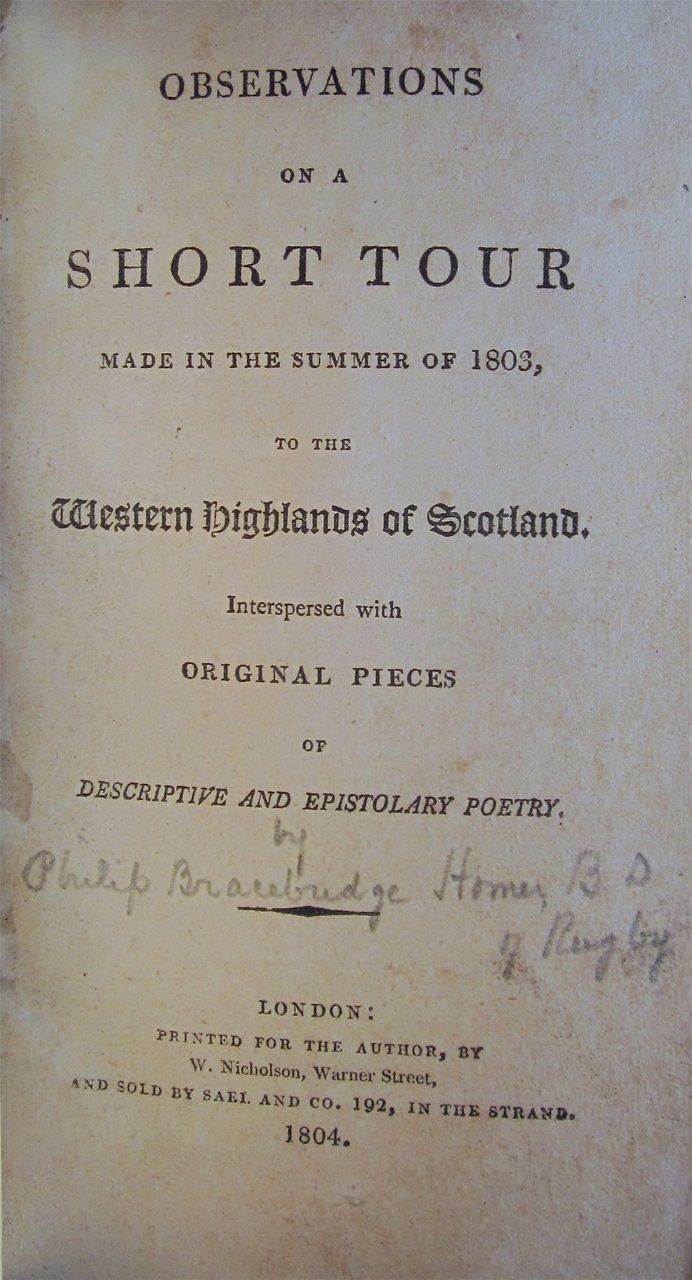10. Dec, 2021
Travellers to the Far North: Accounts I Have Missed.
The trouble with writing a book of the sort I have written (The Immeasurable Wilds) is that the sources are unlimited. There are accounts, like those of Thomas Garnet, that I knew of, but failed for lack of room to incorporate to any great extent in my text, and there are those that I did not know about, and have since come upon, and which I regret being unable to use. This website gives me the chance to add some of the details from the travels of these unacknowledged visitors, and I shall point out both areas of agreement with other travellers, as well as new observations. I hope these will add to the whole picture of what it was like to visit these remote regions in the 18th and 19th centuries.
The first account I want to post on the website page is called Observations on a Short Tour made in the summer of 1803 To The Western Highlands of Scotland. It was published in 1804, and is by Philip Bracebridge Homer, who lived in Oxford. He travelled with a 'Mr. S-', who had a dog called Spot, and who seemed more interested in fishing than anything else. Indeed, Homer's frustrations are aired when Mr. S shows little interest in getting to Staffa: " I believe it is impossible that any two persons should set out from home upon so long an excursion with motives and wishes so totally dissimilar...." This is one of the rare moments in his account when Homer sounds in the least bit tetchy and miserable, for it is on the whole a delightfully informative and positive description of the journey that took them as far north as Loch Maree. Indeed, one reason that I was particularly sorry not to include details of this journey in my book was because he was travelling in exactly the same year as both James Hogg, and the Reverend James Hall, and he received in Ross-shire hospitality from the same man, Mr MacLeod, who is mentioned in Hogg's account. He even mentions seeing there "a young lady, of a very pretty and pleasing countenance, his eldest daughter I suppose". I suspect James Hogg did not fail to notice this attractive apparition as well!
Homer supplies examples of his own poetry throughout his account. He makes no claim that his offerings are of a high calibre, for he is naturally a modest man. But some of them are not without interest, and I quote one here, written as he passed through Glencoe, which if nothing else shows the awe and dread that such scenes inspired in these early 19th century visitors, without any apparent desire to climb the inviting mountains. The poem can be found on pages 51 & 52.
Here sullen Nature scarcely deigns to smile,
But heaps on Mountains high her ragged pile;
Or if she smiles, 'tis in that ghastly way,
As when Death made of human-kind his prey:
Rocks thrown on rocks, still threatening with their fall,
'In naked majesty seems lord of all.'
Tremendous height, if such thine aspect now,
When summer gleams upon thy rugged brow,
How dread how awful must these glens appear,
When winter reigns, if all is awful here!
Then Danger stalks around with hideous form,
Or rides the whirlwind of the blackning storm;
Drinks with delight the groans of deep despair,
And makes the miseries of the world his care:
Here some lost wretch in horror stands aghast
Amidst the howlings of the furious blast;
With trembling feet he tries the untrodden snow,
And shudders at the gulph that lies below;
Down the rough crags he hears the torrents roar,
Once views the precipice, but looks no more.
Cold heavy damps upon his brows he feels;
His limbs all shiver, and his heart congeals;
To move, unable and afraid to think,
He stands like marble on the fearful brink:
O gracious Heav'n, preserve him in that hour,
And guide his footsteps with thy sovereign power.
You will find my notes on Homer's Observations on the page titled 'Homer's Account.'
